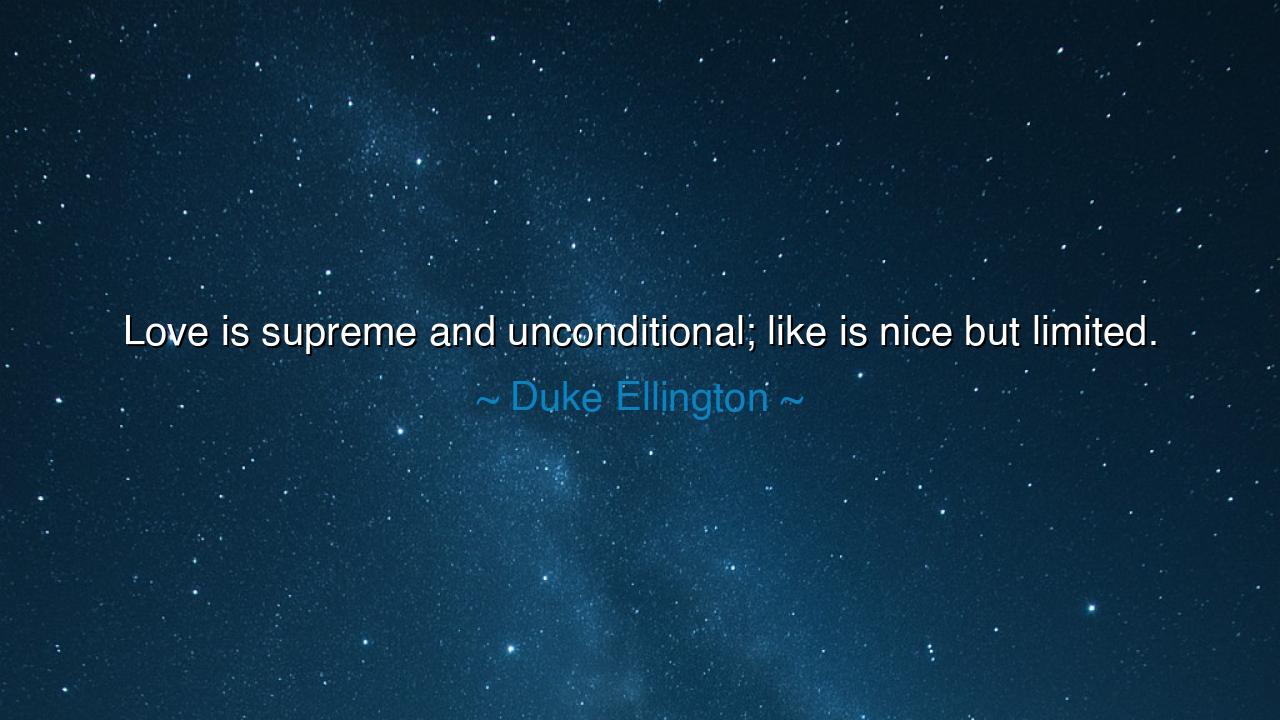
Love is supreme and unconditional; like is nice but limited.






Duke Ellington, the legendary composer and bandleader, shares a profound truth in his words: “Love is supreme and unconditional; like is nice but limited.” In this simple but powerful statement, Ellington draws a sharp distinction between love and like—two emotions that are often confused but are fundamentally different in their depth and power. Love, Ellington tells us, is the highest, most unconditional force in the world. It is the supreme emotion, one that transcends conditions and circumstances. It is not limited by the imperfections of the object of love, nor by the fluctuations of time. Like, on the other hand, while pleasant, is a temporary and conditional feeling. It is limited by personal preferences and external factors, and it does not possess the same enduring power as love.
In the ancient world, the wisdom of love was revered as a force that connected the divine with the mortal. Plato, in his writings, spoke of love as a pathway that draws the soul toward the divine beauty—not limited by the physical, but reaching into the realms of the spiritual and eternal. For Aristotle, love was an expression of virtue and truth. It was not simply about affection or attraction, but about a deep connection to the good, the noble, and the true. Love, for the ancients, was boundless—a force that transcended the individual and reached into the greater good. It was unconditional and everlasting, not based on any transaction or temporary condition. In contrast, like was seen as a lighter affection, one that could change with circumstance, and thus lacked the immortality and depth of true love.
Hercules, the great hero of Greek mythology, provides a powerful illustration of love’s supremacy over mere liking. Hercules' love for his family, for his people, and for his gods was a force that transcended his self-interest. He took on the twelve labors not for fame or wealth, but because he was driven by an unconditional love for the people he sought to protect. This love led him to perform deeds of great sacrifice, where he had to face unimaginable odds, all without the promise of reward. His love was not based on a fleeting affection, but on a deep, selfless devotion. In contrast, there are many others in mythology whose liking was conditional, depending on their own desires or gains, and they often faltered when faced with true sacrifice. Love, for Hercules, was supreme—it demanded everything and, in return, led to his greatness.
Similarly, in the realm of real life, we see the story of Mahatma Gandhi, whose love for freedom and justice was the guiding force of his life. Gandhi’s love was not contingent upon the opinions of others or the political climate; it was unconditional and driven by an inner sense of duty to the greater good. His love for his countrymen, for peace, and for equality led him to endure immense suffering, imprisonment, and even personal loss. His commitment to non-violent resistance was not a matter of liking the people he fought against, but of loving his own principles so deeply that he could never compromise on them. Gandhi’s love was not limited by external circumstances; it was a supreme force that shaped his actions and ultimately changed the world.
Love, as Ellington tells us, is unconditional—it does not depend on reciprocation, nor does it fade when faced with hardship. It is not based on preference or convenience. Like, however, is something more fragile. It can grow, but it can also fade easily. We may like someone for their appearance, their ideas, or their presence, but liking is always based on the conditions we place on the other person. Like is often situational, while love endures through all circumstances. When we love, we give freely, without the expectation of anything in return. When we like, we give based on our preferences and conditions. The true power of love lies in its selflessness, in its ability to endure through all trials and tribulations.
The lesson that Ellington offers us is profound: true love is supreme—it transcends preferences, limitations, and conditions. It is a force that, when embraced, can transform lives and create lasting bonds. Like, though pleasant, is often fleeting and shallow. It is important in the context of relationships, but it is not enough to sustain them in the face of adversity. If we wish to create relationships that endure, to foster connections that are meaningful, we must cultivate love in its purest form—unconditional, enduring, and selfless.
O children of the future, remember this wisdom: love is supreme because it is unlimited and unconditional. When you love, you give without expecting in return, and in doing so, you build the foundation for the most lasting and powerful connections. Do not settle for liking as a substitute for love. Let your love be as enduring as the greatest of heroes and as selfless as the greatest of leaders. Love not because it brings you something, but because it is the most profound force in the universe.






AAdministratorAdministrator
Welcome, honored guests. Please leave a comment, we will respond soon